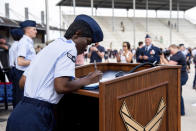(Yahoo) When Esmita Spudes Bidari was a young girl in Nepal, she dreamed of being in the military, but that wasn’t a real option in her country.
Last week, she raised her right hand and took the oath to join the U.S. Army Reserves, thanks in part to a recruiter in Dallas who also is Nepalese and reached out to her through an online group.
Bidari, who heads to basic training in August, is just the latest in a growing number of legal migrants enlisting in the U.S. military as it more aggressively seeks out immigrants, offering a fast track to citizenship to those who sign up.
Struggling to overcome recruiting shortfalls, the Army and the Air Force have bolstered their marketing to entice legal residents to enlist, putting out pamphlets, working social media and broadening their outreach, particularly in inner cities. One key element is the use of recruiters with similar backgrounds to these potential recruits.
The military has had success in recruiting legal immigrants, particularly among those seeking a job, education benefits and training as well as a quick route to becoming an American citizen. But they also require additional security screening and more help filling out forms, particularly those who are less proficient in English.
Both the Army and the Air Force say they will not meet their recruiting goals this year, and the Navy also expects to fall short. Pulling more from the legal immigrant population may not provide large numbers, but any small boosts will help. The Marine Corps is the only service on pace to meet its goal.
The shortfalls have led to a wide range of new recruiting programs, ad campaigns and other incentives to help the services compete with often higher-paying, less risky jobs in the private sector. Defense leaders say young people are less familiar with the military, are drawn more to corporate jobs that provide similar education and other benefits, and want to avoid the risk of injury and death that service in defense of the United States could bring. In addition, they say that little more than 20% meet the physical, mental and character requirements to join.
“We have large populations of legal U.S. residents who are exceptionally patriotic, they’re exceptionally grateful for the opportunities that this country has provided,” said Air Force Maj. Gen. Ed Thomas, head of the service’s recruiting command.
The biggest challenges have been identifying geographic pockets of immigrant populations, finding ways to reach them and helping any of those interested navigate the complex military recruiting applications and procedures.
Last October, the Army reestablished a program for legal permanent residents to apply for accelerated naturalization once they get to basic training. Recruiters began to reach out on social media, using short videos in various languages to target the top 10 countries that recruits had come from during the previous year.
The Air Force effort began this year, and the first group of 14 graduated from basic training and were sworn in as new citizens in April. They included recruits from Cameroon, Jamaica, Kenya, the Philippines, Russia and South Africa. As of mid-May there were about 100 in basic training who had begun the citizenship process and about 40 who had completed it.
Thomas said the program required changes to Air Force policy, coordination with U.S. Citizenship and Immigration Services and a careful screening process to ensure there are no security risks.
“We have to take exceptional measures to be able to thoroughly vet and go through the security clearance investigation,” he said, adding that in many cases the immigrants are not immediately put in jobs that require top secret clearance.






